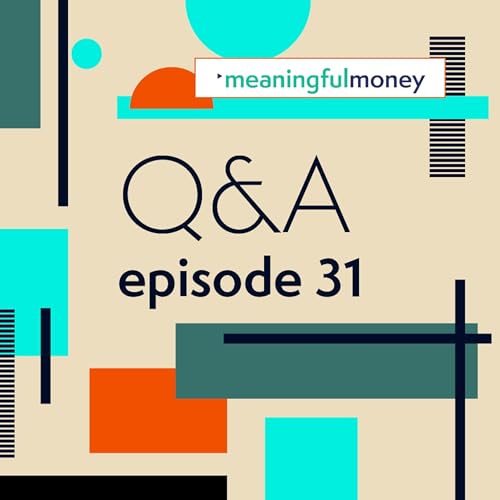It's another mixed-bag of questions this week, covering income protection, the local government pension scheme, avoiding the 60% tax trap and much more besides! Shownotes: https://meaningfulmoney.tv/2025/10/08/listener-questions-episode-28/ 01:33 Question 1 Hello Pete & Rog I like to think of you as a couple of great mates offering me life changing information in a relaxed & entertaining fashion. When putting income protection in place, how do people/planners typically frame a target? Just replacing essential income? Or also replacing large contribution to pensions (including lost employer contributions) and S&S ISAs for long term wealth building? Thoughts on how I should frame these questions are very welcome! Many thanks, Duncan 11:27 Question 2 Dear Pete and Roger, Firstly thank you so much for all the free resources you put out there to try and help make the world more financially literate and astute. I myself started a journey of self awareness a few years ago thanks in no small part to your content. I have a question about pension recycling and what is allowable. I've read the rules on the criteria, all of which I think have to be met in order to fall foul of the rules, but am not clear on my wife and my specific situation. My wife and I met later in life and have been married for 13 years in a happy and stable relationship. I've just turned 50 but my wife is eight years older. In summary when we came together I brought earning potential but no assets (previous divorce wiped me out!) and she brought assets (house, SIPP pension built up, inheritance) but, through mutual agreement, no earning potential. Fortunately we have a healthy open discussion about money. I am an additional rate tax payer and use my £60,000 limit of pension contributions every year. We have paid off our mortgage and we have always lived using my salary for all our outgoings and live within our means with little consumer debt. I max out my ISA allowance too. Essentially I have no more tax breaks we could take advantage of by her giving me money, save for CGT or dividend allowances. After thinking about her tax implications I have encouraged my wife in the last couple of years to start to withdraw from her DC pension the maximum amount that would result in no income tax being paid (currently £16,760 of which 25% is tax free). Since we don't need the money for living expenses she tops it up with her savings to £20K and puts it in a S&S ISA so really is just moving investments from a less flexible tax free wrapper to a more flexible one while she pays no income tax. We will do this for the next ten years until she reaches state pension age and I retire myself. She'll still have a sizeable SIPP at this point as this strategy won't deplete all her pension. She still has significant other assets that attract tax as she earns more interest than the starter rate for savings allows tax free. She's fully paid up all her NI through additional contributions, has the maximum in premium bonds and I also have started to get her to put £2,880 into a new SIPP in her name every year to get 20% tax relief. My question (sorry it took so long to get here) is that now she is drawing an income of sorts from her DC pension could she recycle more than £2,880 into a SIPP? Clearly it fails on the intention front, on the >30% of the tax free cash and the fact she has actually taken tax free cash. But she's not taking in excess of £7,500 of tax free cash in a 12 month period (another one of the criteria) and I'm also not sure if her taxable DC withdrawals (on which she pays no income tax as <£12,570) count as relevant earnings as to how much she could add to a SIPP. Basically could she pay say £5,000 or £10,000 a year into a SIPP (gross as she has triggered MPAA), gain 20% tax relief on her net contribution and not be falling foul of pension recycling rules? The reality of the situation that the real source of all the contributions is significant savings she has that are now attracting tax and we don't need any of it, nor its growth, for at least ten years. Any advice gratefully received, Tom 15:56 Question 3 Dear Pete and the lovely Roger Weeks, Hope you are well. Thanks for all the amazing work you are doing to support people to have a better understanding of their personal finances. I have recently bought and read your new book, it's fantastic. Plus, I have bought several copies of your first book and given them to family and friends as presents. I love a practical gift haha; not sure the recipients feel the same but it's a gift that will keep giving if they follow your advice. Anyway, my question is related to a defined benefits pension. Background info, I am 49 (50 in a few weeks) and my husband is 64. From 1996 to 2000 I built up benefits within Merseyside Local Government Pension Scheme. I transferred this along with a DC pension from the voluntary sector (at the time I heard this was a good idea, I literally didn't have ...
Mehr anzeigen
Weniger anzeigen
 Oct 29 202544 Min.
Oct 29 202544 Min. Oct 22 202535 Min.
Oct 22 202535 Min. Oct 15 202543 Min.
Oct 15 202543 Min. Oct 8 202542 Min.
Oct 8 202542 Min. Sep 24 202543 Min.
Sep 24 202543 Min. Sep 17 202533 Min.
Sep 17 202533 Min. Sep 10 202533 Min.
Sep 10 202533 Min. Sep 3 202543 Min.
Sep 3 202543 Min.

